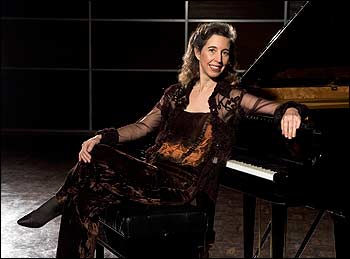
Making It Up As They Go
Improv festival mixes media
by Brett Campbell
One of Eugene’s most adventurous homegrown music events returns to downtown this weekend. For fans of jazz, contemporary postclassical music and film, the Improvised Music Moving Image Festival, better known as IMMI Fest, presents a parade of startling artistic surprises. It’s a shotgun marriage involving not just musical genres, but also cities with strong improv scenes, Vancouver, B.C. (home of the guest trio Knotty Ensemble) and Eugene. Local lights include saxophone stars Joe Manis and Hashem Assadullahi, who both released strong albums last year, bassist Tyler Abbott, guitarist Bill Marsh and trumpeter Douglas Detrick, and Any Permutation. The festival, which takes place Feb. 5-7 at the Jazz Station, is a feast for the eyes as well since some of the improvisations accompany classic silent films and video art.
The UO opera program has recently built a deserved reputation for imaginative if necessarily bare-bones productions that are often more inventive than some conservative big budget opera companies stage. The latest, Mozart’s magnificent The Magic Flute, maintains that freshness by, paradoxically, looking backward. Even if you’ve seen the opera before (at the UO in 2003 or Eugene Opera in 2007, say), this one will sound quite different — much closer to what Mozart heard. This historically informed performance conducted and directed, respectively, by UO profs Marc Vanscheeuwijck and Nicholas Isherwood, will use an orchestra whose size, tempos, playing styles, tunings and interpretation more closely resemble what the composer intended than any recent versions. It also looks forward to contemporary productions, using live and prerecorded video, offstage action, modern English dialogue and a visual concept Isherwood describes as “Morocco meets Papua, New Guinea.” The enchanting story should shine through more clearly. You can see it Feb. 12-13 at Sheldon High School.
Speaking of historically informed Mozart, one of the scholar-performers who’s contributed the most to our under-standing of Amadeus music is Robert Levin, who’s appeared at the Oregon Bach Festival several times. Appropriately, on Valentine’s Day at Beall Concert Hall Levin and his wife, pianist Ya-Fei Chuang, will play delectable music by Mozart, Debussy and Francis Poulenc, along with works by Brahms and Rachmaninoff.
Several other strong recommendations dot this month’s UO music calendar. At 3 pm Feb. 7 at Beall, faculty members Fritz Gearhart and David Riley perform a splendid program of violin and piano music that includes sonatas by Grieg and Mozart, Claude Debussy’s mysteriously beguiling late sonata and, commendably, the premiere of “Celestial Fantasy,” a new work by UO alum Terry McQuilkin. On Feb. 5, the Oregon Wind Ensemble plays 20th century music by Samuel Barber, Percy Grainger, Eugene Symphony composer in residence Steven Stucky and more. And on Feb. 11 (not Feb. 8 as we originally listed), Dean Kramer will complete his performance of J. S. Bach’s masterwork, The Well Tempered Keyboard. And speaking of Bach, Richard Guy will play a free afternoon concert of his harpsichord music on Feb. 6 at the Atrium building, 10th & Olive. Compare and contrast the difference between Bach on modern piano and the plucked strings he actually composed for.
 |
| Angela Hewitt |
Still another acclaimed pianist, Angela Hewitt, best known for her Bach interpretations, takes on Beethoven’s Piano Concerto #4 with the Eugene Symphony on Feb. 18, in a Hult Center concert that also features another Stucky work, his Pulitzer Prize-winning Second Concerto for Orchestra — great to hear a contemporary work on an ESO program — and Ralph Vaughan Williams’s popular Fantasia on a Theme by Thomas Tallis.
Finally, the Cascadia Clarinet Quartet, which features Eugene Symphony members Carol Robe and Mike Curtis, will play music by George Gershwin, Victoria, Albeniz and folk arrangements at 4 pm Sunday, Feb. 7, at First United Methodist Church, 1376 Olive.
Asian classical music has been getting more and more exposure since the world music movement brought sounds from India, Indonesia, China and more. But an important Asian musical culture is often neglected in the west: Korean music. The UO Cultural Forum aims to rectify that with a powerful concert at the EMU Ballroom Feb. 11, featuring South Korean samulnori group Noreum Machi. Like taiko, this percussion based music and dance sprang from peasant folk tunes with shamanistic, ritual overtones, then developed into virtuosic ensemble form, also allowing some improvisation, dance and storytelling, after WWII. It looks like a rare and valuable glimpse into a very different, very powerful music than we usually hear even in this globally aware era.
On Feb. 7 at the Shedd, the Emerald City Jazz Kings play a tribute to the great songwriter Frank Loesser (“Baby, It’s Cold Outside,” Guys and Dolls and many more). On Feb. 11, also at the Shedd, UO prof and KLCC announcer Carl Woidek leads the latest in his jazz heritage project: a tribute to Antonio Carlos Jobim, whose breezy bossa nova beat dominated South and North American pop music just before the Brit invasion led the resurgence of rock.